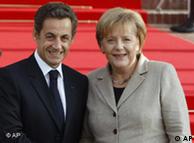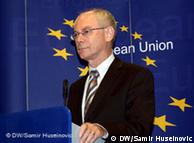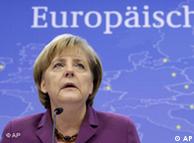EUROPEAN UNION | 29.10.2010
Partial victory for Merkel at European Union summit
The German media have offered guarded praise for an agreement in Brussels to make limited changes to the European Union's main treaty, describing it as a compromise that bought time to find a lasting remedy to prevent future debt crises.
Under pressure from German Chancellor Angela Merkel and French President Nicolas Sarkozy, European Union leaders set in motion plans to amend the Lisbon Treaty to create a system to ward off financial crises. They also endorsed tougher sanctions on states that do not keep their public debt in check.
Merkel had insisted on suspending voting rights for member states which breach the rules, but failed to win widespread support for this demand. Smaller EU states in particular were opposed to this idea.
Overcoming hostility
 Initially Merkel only had the support of Sarkozy
Initially Merkel only had the support of Sarkozy
Initially Germany and France faced strong hostility to their proposals to change the Lisbon Treaty. A number of states rejected the idea of far-reaching amendments that would have forced them to hold referendums, which would have been expected to fail. Chancellor Merkel was forced to back down on this issue.
The German chancellor had been battling for weeks to push through changes that would provide the eurozone with greater stability. At home, she has faced public hostility to the bailout of Greece and the creation of a massive rescue fund designed to protect the euro.
Merkel wanted to write the creation of the rescue fund into the treaty. Europe's biggest economy contributed the bulk of the 750-billion-euro ($1 trillion) European Financial Stability Fund, which was hastily established in May to save Greece from financial collapse. The fund is now to be turned into a "permanent crisis mechanism."
At the EU summit in Brussels, which started on Thursday, Merkel fought into the night to push through her proposals, winning agreement only in the early hours of Friday morning.
The German chancellor said she was satisfied with the outcome of the summit: "We have put forward our essential points," she said. "Everyone is in agreement that a limited change to the Lisbon Treaty is necessary."
Merkel stressed the new crisis mechanism would only be "valid for cases in which the stability of the euro as a whole is at risk."
"Should a country ever need to make use of this, it would be faced with very strict requirements," she said.
Cautious welcome from the German media
The German business daily Handelsblatt said the agreement was a significant achievement, calling it a "breakthrough" for Merkel, whose center-right coalition has suffered a drop in support in the polls in recent months.
However, because Merkel's more far-reaching treaty changes were put on the backburner, the German newspaper Hannoversche Allgemeine Zeitung said the deal amounted to a "light solution" to the problem of imposing budgetary discipline.
 Van Rompuy is now charged with drafting the changes
Van Rompuy is now charged with drafting the changes
Guenther Kirschbaum, a member of Merkel's Christian Democrats, who chairs the European Affairs committee in the lower house, said the agreement amounted to real progress.
"It is a great step forward because we now have a crisis mechanism so that in future we will not have to deal with problems like the Greek crisis on an ad hoc basis," Kirschbaum said.
The proposed changes to the Lisbon Treaty are to be drafted in time for another EU summit in December. The changes are to be agreed and implemented by 2013, when the current rescue fund expires.
European Council President Herman Van Rompuy told a news conference in Brussels that "important decisions to strengthen the eurozone" had been taken. "We recommend a robust and credible permanent crisis resolution mechanism to safeguard the financial stability of the eurozone as a whole," he added.
Author: Joanna Impey (AFP, Reuters, dpa)
Editor: Chuck Penfold


No comments:
Post a Comment